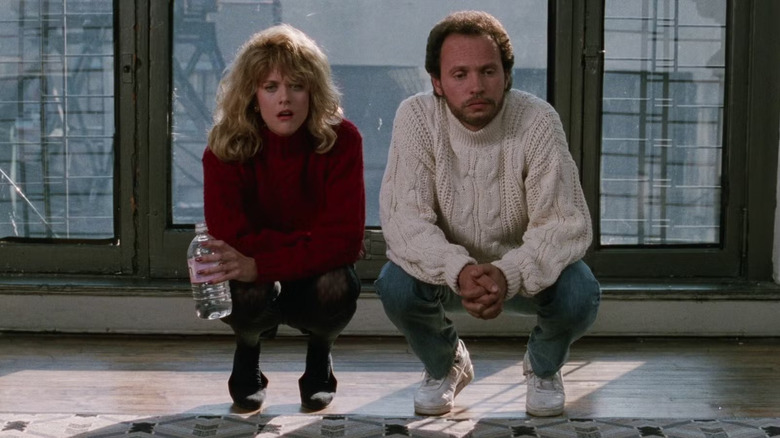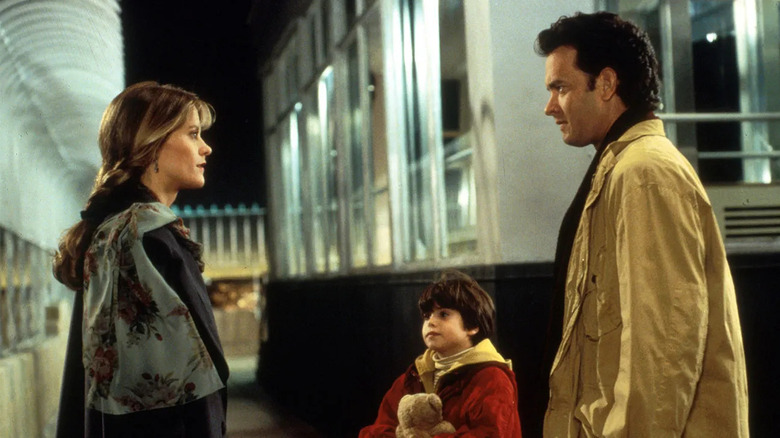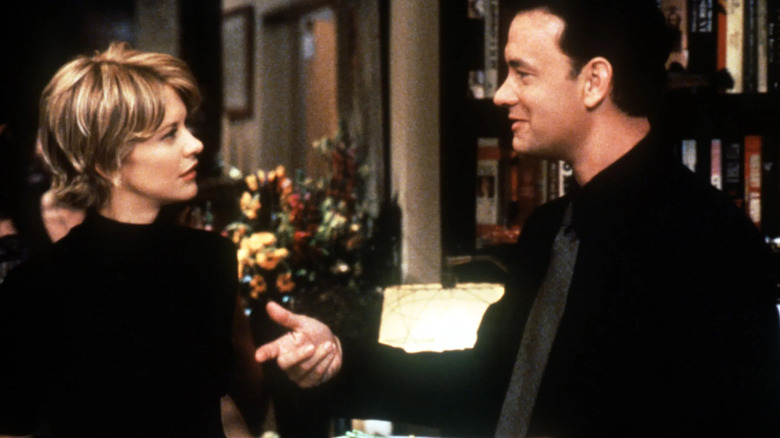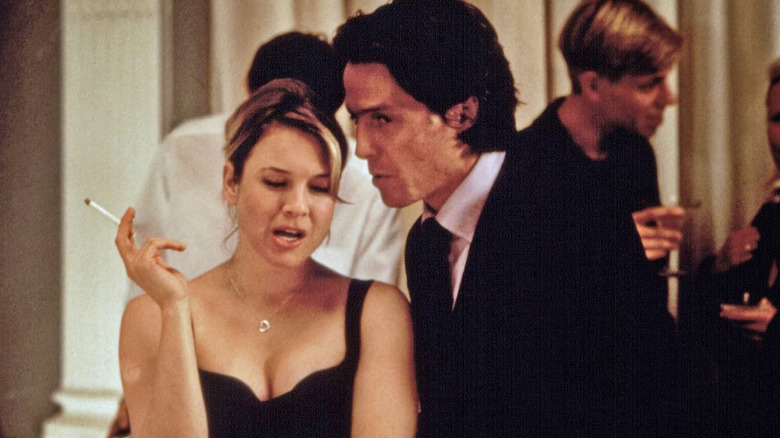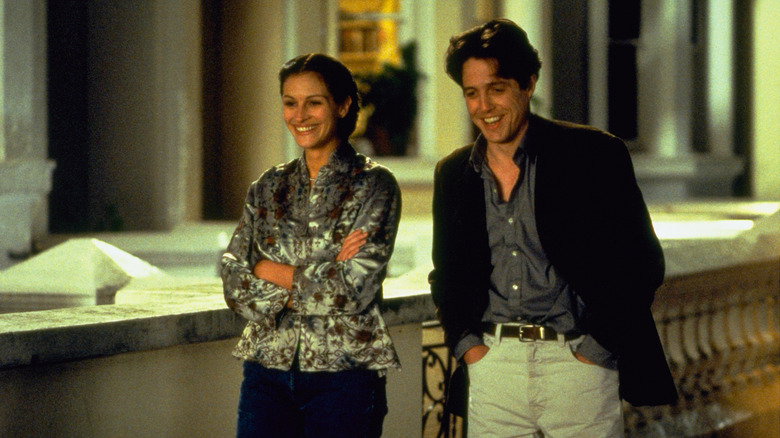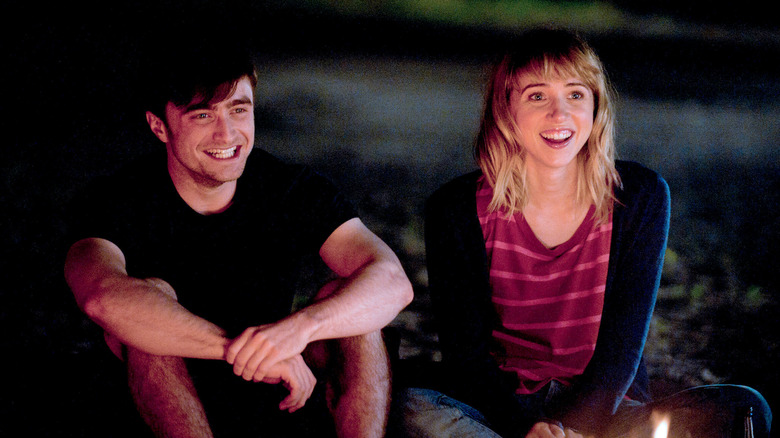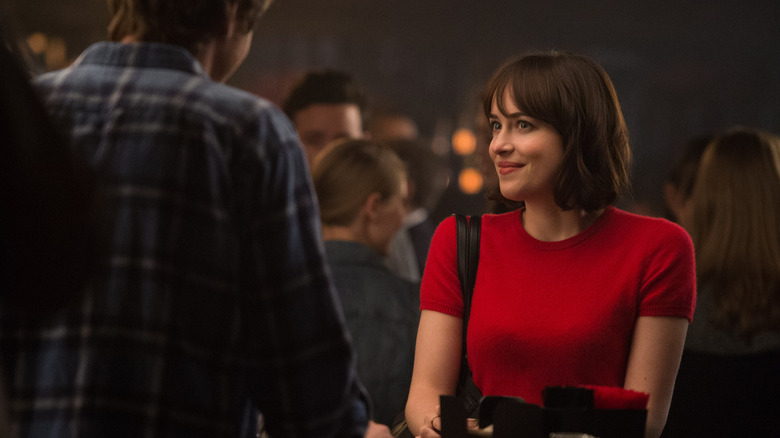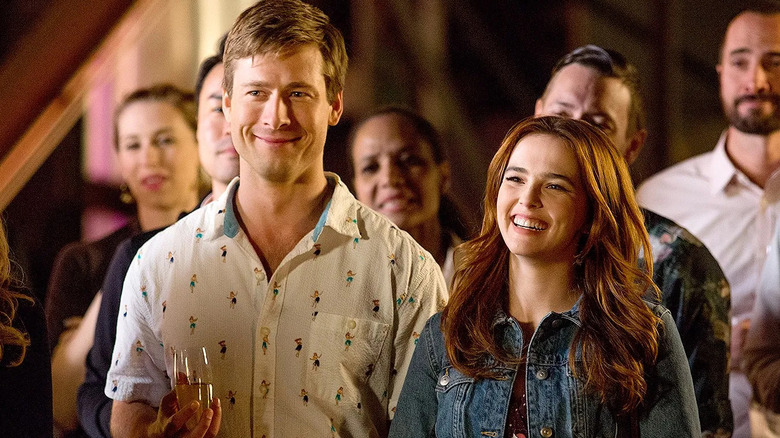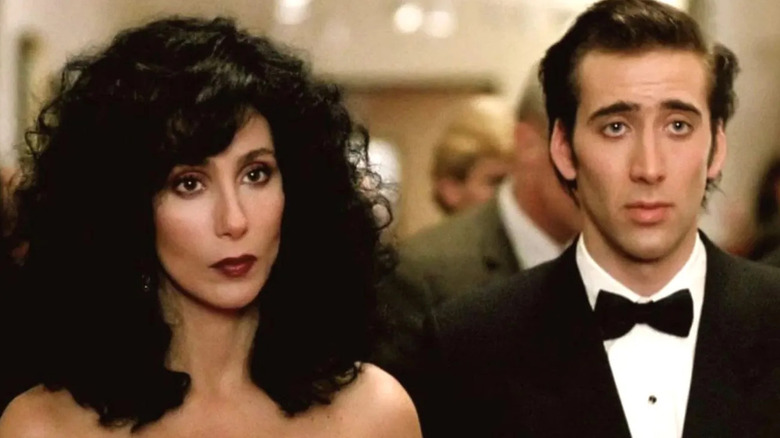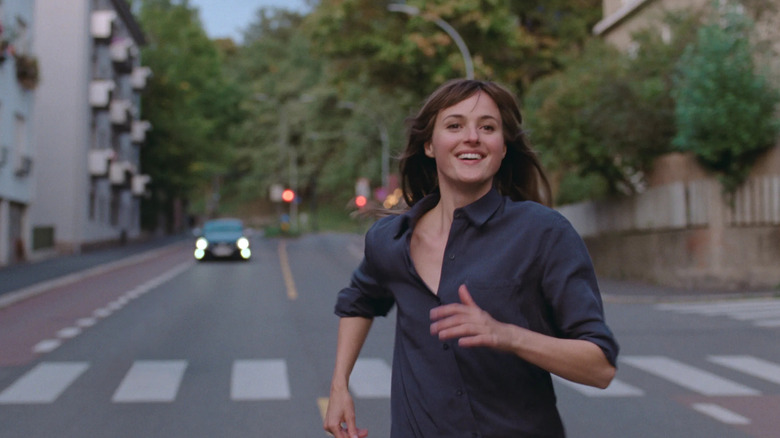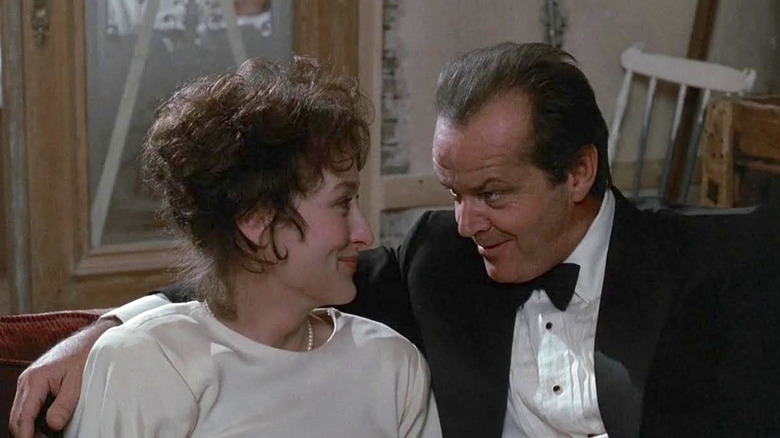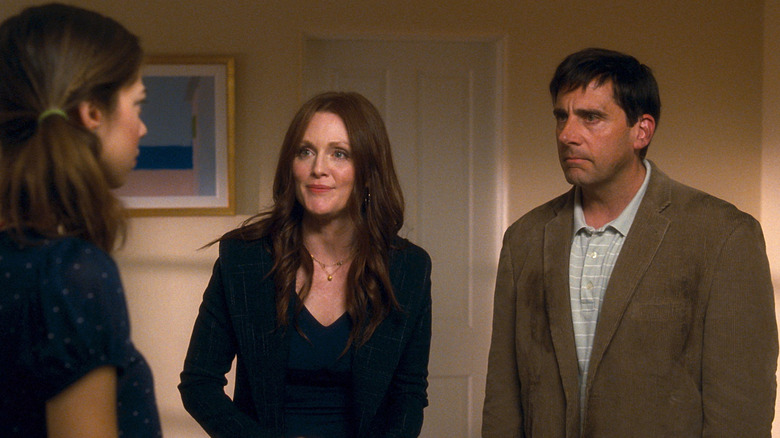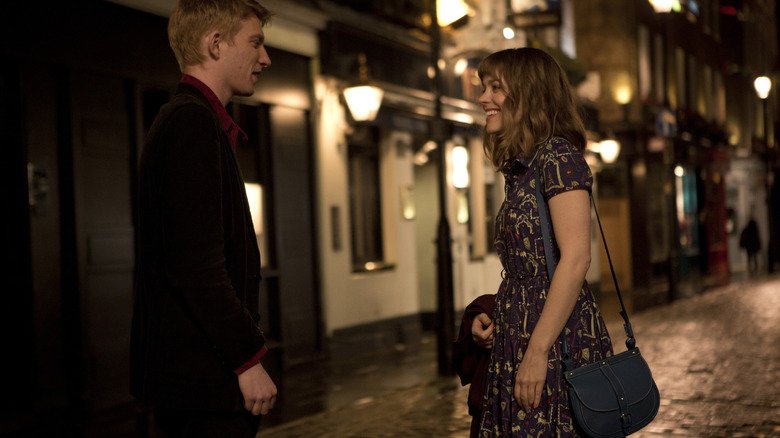12 Best Movies Like When Harry Met Sally
When it comes to great romantic comedies, "When Harry Met Sally" is the undeniable champion. Released in 1989 with writer Nora Ephron and director Rob Reiner behind the camera, the decades-spanning film tells the story of Sally Albright and Harry Burns — played by Meg Ryan and Billy Crystal — from the day they meet driving from Chicago to New York, concluding in the satisfying moment where they finally kiss and profess their love to one another. Thanks to Ephron's crackling script, Reiner's quick, clever direction, and a scene-stealing supporting turn from the late, great Carrie Fisher, "When Harry Met Sally" is the classic rom-com; after all, it's the movie responsible for the line "I'll have what she's having."
If you just finished "When Harry Met Sally" for the first or fiftieth time, what should you watch next? Well, we're here to help you out. There are a lot of other classic romantic comedies that pair perfectly with "When Harry Met Sally," including entries to the canon that were also penned by Ephron ... but there are also some great modern rom-coms that carry on the tradition of "When Harry Met Sally," whether they're using the enemies-to-lovers trope or letting its characters fall in love with New York City. Here are 12 movies you should check out if you love "When Harry Met Sally."
Sleepless in Seattle
Nora Ephron made it a point to work with Meg Ryan on multiple romantic comedies, and there are three examples of this that come to mind. We'll circle back to that third one, but after "When Harry Met Sally," Ephron and Ryan teamed up for "Sleepless in Seattle" in 1993, pairing the starlet with another beloved performer: Tom Hanks. The film centers around Ryan's character Annie Reed, a reporter from the Baltimore Sun who hears widower and architect Sam Baldwin (Hanks), who lives in Seattle, on a nationally syndicated radio show talking about the recent loss of his wife and his enduring love for her. Annie is immediately entranced by Sam's story and his obvious kindness and sensitivity — and even though she's already engaged to a guy named Walter Jackson (Bill Pullman), she ends up asking Sam to meet her atop the Empire State Building on Valentine's Day (a very obvious nod to "An Affair to Remember," which Annie actually 'watches' during the narrative of "Sleepless in Seattle").
Despite obstacles, Sam's eight-year-old son Jonah (Ross Malinger) convinces his dad to give Annie a chance, and when both Annie and Sam end up in New York City for Valentine's Day, viewers get exactly the ending they're hoping for as Sam, Annie, and Jonah all end up together, so to speak. "Sleepless in Seattle" isn't quite as pitch-perfect as "When Harry Met Sally," but it's an important part of the Ephron-Ryan canon.
You've Got Mail
In 1998, Meg Ryan and Nora Ephron "completed" their trilogy of sorts with "You've Got Mail," a charmingly antiquated flick that pairs Ryan up with Tom Hanks for a second time and positions them as rival business owners who strike up an unexpected connection. When independent bookstore owner Kathleen Kelly (Ryan), who goes by the name "Shopgirl" on AOL, starts chatting with a stranger on the internet she only knows as "NY152," she has no idea that the person behind the account is Joe Fox (Hanks), owns Fox Books, a big chain that could put Kathleen's small store out of business. Both of them are dating other people — Kathleen's boyfriend is a liberal columnist named Frank Navalsky (Greg Kinnear), and Joe is in a relatively unhappy relationship with a publisher named Patricia Eden (Parker Posey) — but as they keep chatting online, sparks fly.
Though Kathleen and Joe attempt to meet up offline and it initially goes awry, Joe ends up romancing Kathleen without revealing that he's "NY152" after ending his relationship with Patricia, and once she realizes he's the guy she's been talking to the whole time, she's thrilled. Yes, "You've Got Mail" is a little awkward and really dated when it comes to technology, but if you want to experience the full Ephron-Ryan run through the late 1980s and early 1990s, check it out.
Bridget Jones's Diary
Based on Helen Fielding's hit novel of the same name, Sharon Maguire's 2001 movie "Bridget Jones's Diary" is technically a modern take on Jane Austen's romantic novel "Pride & Prejudice," but it's also a movie that certainly takes some cues from "When Harry Met Sally." When our titular Bridget Jones (Renée Zellweger) first meets the irascible Mark Darcy (Colin Firth) at her mother's "turkey curry buffet" on New Year's Day, they don't exactly hit it off, but Bridget puts him out of her mind once she returns to her publishing job in London and resumes lusting after her cad of a boss Daniel Cleaver (Hugh Grant). If you're familiar with "Pride & Prejudice," you know where this is all going — Daniel will be revealed as the real "bad guy," leaving things open for Mark and Bridget — but it's still an absolute delight to watch the movie arrive at this point.
Mark and Bridget, much like Harry and Sally, are polar opposites who learn to appreciate their stark differences; in one of the most romantic moments in rom-com history, Mark tells Bridget that he likes her "very much" just as she is, echoing Harry's final speech to Sally. Plus, both movies center around New Year's, so they're perfect for a New Year's Day movie marathon after you've had a little too much champagne.
Notting Hill
"When Harry Met Sally" is one of the best romantic comedies ever made, and it's also a story about meeting someone when you least expect it. That's why it could make a perfect double feature with "Notting Hill." Released in 1999, written by Richard Curtis, and directed by Roger Michell, the film named for a gorgeous London neighborhood focuses on William Thacker (Hugh Grant), who runs a bookstore in the titular Notting Hill and dealing with a messy divorce. One day, an extremely famous American actress named Anna Scott, played by Julia Roberts, comes in to buy a travel book, and the connection between them is instantaneous — even after William dumps a full drink all over Anna during their second chance meeting. After Anna invites William to visit her at the Ritz — and he ends up accidentally masquerading as a reporter — they attend a party with his friends, confirming the fact that the two are experiencing real feelings for one another.
A true comedy of errors follows, including Anna's oafish boyfriend Jeff (Alec Baldwin in an uncredited role) showing up, a series of gutting miscommunications, and several breakups between Anna and a particularly heartbroken Will. Finally, just like Harry Burns before her, Anna makes a grand gesture and takes a year off from acting to spend time with Will in London, even gifting him a rare Chagall painting they both love. "Notting Hill" is one of the best classic rom-coms, and it also pairs surprisingly well with "When Harry Met Sally."
The F Word (What If?)
Sometimes, the best romantic relationships start as great friendships, which is exactly what the story of "The F Word" — called "What If?" in some countries — has in common with "When Harry Met Sally." When we first meet Wallace, played by an effortlessly charming Daniel Radcliffe, he's a recent medical school dropout whose ex-girlfriend cheated on him with one of their professors ... and when he heads to a party hosted by his best friend Allan (an incredibly deployed Adam Driver), he has a chance meeting with Allan's cousin Chantry (Zoe Kazan). Unfortunately, when he walks her home from the party — where Allan ends up romancing Nicole, played by Mackenzie Davis early in her career — Wallace finds out that Chantry, with whom he's immediately smitten, lives with her boyfriend Ben (Rafe Spall).
Wallace and Chantry become platonic friends at first, but it becomes impossible to deny the spark growing between them, especially after Ben ends up moving away from the film's setting of Toronto and spending six months in Dublin. When Chantry and Wallace both end up traveling to Dublin — Chantry to see Ben, and Wallace to chase after Chantry — everything comes to a head, but their love story still manages to conclude in a sweet, satisfying way. "The F Word" (or "What If?") is a fully underrated romantic comedy; if nothing else, watch it for Driver's super-specific line reading about how he's about to eat nachos.
How to Be Single
There's one major difference between "When Harry Met Sally" and "How to Be Single," which is that, at the end of the latter film, the protagonist doesn't end up in a couple. Still, "How to Be Single" feels like a spiritual successor to "When Harry Met Sally" as a film about how hard it is to date in New York City while you're still trying to figure out who you are and what exactly you want out of life. At the beginning of "How to Be Single," Alice Kepley (Dakota Fanning) breaks up with her college boyfriend Josh ("Succession" standout Nicholas Braun) as they graduate, explaining that they need time to explore before settling down; it doesn't take long for her to ask for Josh to take her back, only for Alice to discover that he found a new girlfriend. Heartbroken, Alice turns to her new friend Robin (Rebel Wilson) so that she can learn how to "effectively" be single in New York, hooking up with commitment-phobic bartenders like Tom (Anders Holm) and meeting real prospects like David (Damon Wayans Jr.).
Alice's story of self-assurance is told alongside ones about her sister Meg (Leslie Mann), who decides to have a baby on her own before meeting a younger man named Ken (Jake Lacy), and Lucy (Alison Brie), who's maybe a little too desperate to find love. All in all, "How to Be Single" is a deeper look at self-actualization than you might expect, and it feels like a fresh take on "When Harry Met Sally."
Set It Up
When Harry Burns meets Sally Albright, they don't get along at first ... which is also true of Harper Moore and Charlie Young, the protagonists of Claire Scanlon's 2018 Netflix rom-com "Set It Up." Played by Zoey Deutch and Glen Powell, Harper and Charlie both have big dreams — Harper wants to be a major sportswriter, and Charlie hopes to strike it big at his venture capitalism firm — but their bosses constantly get in the way of achieving those dreams. Why? Harper's boss Kirsten Stevens (Lucy Liu), who runs a sports journalism company, keeps Harper so busy that she never has any free time to write, and Charlie's boss, venture capitalist Rick Otis (Taye Diggs), is just an absolute jerk who also monopolizes Charlie's time constantly.
The two come up with an idea: what if Kirsten and Rick got together, leaving Harper and Charlie with more free time to live their lives? This works for a while — until Rick's behavior reveals his true self — but along the way, Harper and Charlie start falling for each other. If you're looking for the "enemies to friends to lovers" trajectory from "When Harry Met Sally," you'll love "Set It Up."
Moonstruck
One of the most beloved romantic comedies of all time — which also earned an Oscar for its leading lady — has a lot in common with "When Harry Met Sally," in that it tells the story of an uptight, traditional woman falling in love with a somewhat erratic and unpredictable man. Moonstruck, which came out in 1988 with Norman Jewison directing a script by John Patrick Shanley, introduces us to Loretta Castorini (Cher), a widow who accepts a proposal from her boyfriend Johnny Cammareri (Danny Aiello) before he heads to Sicily. Loretta, who enjoys Johnny's company but isn't necessarily in "love" with him, faces an unexpected hurdle when she meets Johnny's estranged brother Ronny (Nicolas Cage), a baker with a wooden hand who ends up entrancing Loretta quite unexpectedly.
"When Harry Met Sally" tells the story of two lovers who can't seem to get their timing right, and at the end of the day, so is "Moonstruck." Come for Cher's award-winning performance, and stay for her chemistry with Cage and Shanley's crackling (and Oscar-winning) script.
The Worst Person in the World
When Joachim Trier's dark romantic comedy "The Worst Person in the World" premiered at the 2021 Cannes Film Festival, it earned rave reviews and officially entered the rom-com canon — and it, like so many other modern romantic comedies, definitely takes some cues from "When Harry Met Sally." Still, be warned: "The Worst Person in the World," which stars Renate Reinsve (who won an award at Cannes for her performance) as Julie, Anders Danielsen Lie as her boyfriend Aksel, and Herbert Nordrum as her lover Eivind, is quite a bit darker and more serious than "When Harry Met Sally" or, truly, than any of the other films on this list.
Julie, an aimless young woman who keeps changing jobs — moving from medical school to psychology, among other things — is in a relationship with Aksel, but after meeting Eivind at a wedding reception they both crash, they fall in love. Even though she ends her relationship with Aksel, Julie still finds herself drawn to him as things between Eivind get increasingly complicated, leaving Julie at a crossroads. "The Worst Person in the World" is a very different kind of romantic comedy, but it's also a new staple of the genre.
Heartburn
Nora Ephron is best known for movies like "When Harry Met Sally," "Sleepless in Seattle," and "You've Got Mail," but don't overlook "Heartburn," the writer-director's most personal project. Based on her own novel of the same name as well as her real life and directed by the legendary Mike Nichols, "Heartburn," which released a few years before "When Harry Met Sally" in 1986, introduces audiences to food critic Rachel Samstat (Meryl Streep), who finds herself charmed by political journalist Mark Forman (Jack Nicholson) after they meet at an event in Washington D.C. (In real life, Ephron was married to political journalist Carl Bernstein, who serves as the inspiration for Mark.)
Though Mark and Rachel happily marry after a quick romance and ultimately have two children, their marriage is constantly marred by Mark's ongoing affair with a socialite named Thelma Rice (Karen Akers), leaving Rachel to decide if she wants to stay with Mark or move on. Narratively, "Heartburn" doesn't share a ton of connective tissue with "When Harry Met Sally," but it's an important piece of Ephron's lore.
Crazy, Stupid, Love.
A big message found within "When Harry Met Sally" is about the enduring power of true love, but more specifically, the movie argues that love can be really difficult, as we see in Harry's final monologue to Sally (where he tells her that he even loves all the things about her that drive him up a wall, including the unbelievably specific and fussy way she orders a sandwich). In 2011, co-directors Glenn Ficarra and John Requa made a somewhat similar argument in "Crazy, Stupid, Love," an ensemble film about high school sweethearts whose relationship hits a seemingly insurmountable hurdle. When Emily Weaver (Julianne Moore) tells her husband Cal (Steve Carell) that she wants a divorce after decades of marriage, he's utterly shocked and heartbroken ... and as Cal tries to pick up the pieces, he meets a womanizer named Jacob (Ryan Gosling) who promises to take the older, newly single man under his wing. (Emily, for her part, is busy going on dates with Kevin Bacon's David Lindhagen, the guy who inspired her to ask Cal for that divorce.)
As Cal's son Robbie (Jonah Bobo) desperately tries to romance his babysitter Jessica (Lio Tipton), Cal has an ill-advised hookup with Robbie's teacher Kate Tafferty (Marisa Tomei), and Jacob finds himself in a real relationship with a woman named Hannah (Emma Stone), the story builds to Cal and Emily's reunion — but expresses that you have to fight for the love you want in life. It's safe to say that Harry Burns would agree.
About Time
What if Harry of "When Harry Met Sally" could travel through time? That's sort of the question posed by "About Time," Richard Curtis' sweet ode to appreciating everything your life has to offer that hit theaters in 2013. As Tim Lake (Domhnall Gleeson) prepares to move to London on his own and leave his mother Mary (Lindsay Duncan), sister Kit Kat (Lydia Wilson), and dad James (Bill Nighy) behind at their cliffside house in Cornwall, James shares a family secret with his son. All of the Lake men can, as it happens, travel through time; all they have to do is go into a small, enclosed space, think of the moment to which they'd like to return, and squeeze their fists. After trying it so that he can behave like less of a dork at a New Year's Eve party, Tim realizes his dad is serious and heads to the capital city with his newfound power.
Once Tim meets Mary (Rachel McAdams) in London, he's immediately smitten ... and uses his time travel to engineer the perfect conditions for the two of them to get together, fumbling along the way (including one attempt where he goes back too far in time and loses her phone number). This ends happily — Mary and Tim marry and have two babies — but when James reveals he's dying, Tim must use his power judiciously and wisely to both preserve his family and spend time with his dad. "About Time" is deeply heartfelt and amazingly grounded for a movie about time travel, and it's a very worthy successor to a great rom-com like "When Harry Met Sally."
